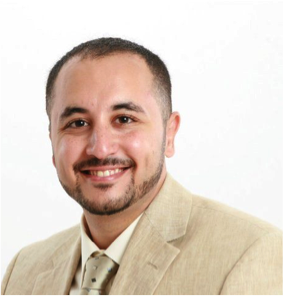Apr 20: Cognitive Radio and Software Defined Radio
Cognitive Radio and Software Defined Radio …. A Gentle Introduction
By Yahia Tachwali, PhD
Wed April 20, 2016 at 6:30 pm
Pizza 6:30 pm, talk 7 pm
California Lutheran University, Swenson Building, Room 101
Meetings are free and open to the public
Register at this link http://sdr.eventbrite.com
Smart phones … are they smart enough?!! Not really. There is actually an increasing demand for improving the efficiency of wireless systems. Current wireless systems suffer severe radio spectrum underutilization due to a number of problematic issues, including wasteful static spectrum allocations; fixed radio functionalities and architectures; and limited cooperation between network nodes. Significant research efforts aim to find alternative solutions to improve spectrum utilization. Cognitive radio based on software defined radio technology is considered one novel approach for solving those problems. Cognitive radio (CR) refers to an adaptive radio capable of changing operation parameters—frequency, modulation, power, and bandwidth, depending on the radio environment, user communication experience, and geo-location. Software Defined Radio (SDR) refers to the implementation platform for cognitive radio. These platforms are based on highly configurable architectures to support flexible radio functionality needed for cognitive radio. In essence, SDR is considered the enabling technology for CR.
This Tutorial provides a gentle introduction to cognitive radio and software radio world. It presents the fundamental building components of cognitive radios and present current solutions for software radio platforms. It sheds the lights also on how to seek more information about those subjects.
 Yahia Tachwali, Ph.D. is a Research and Development Engineer at Keysight Technologies. He worked as a postdoctoral researcher at the Georgia Institute of Technology, in the Broadband Wireless Networking Lab under the supervision of Prof. Ian F. Akyildiz. He received his Ph.D. in Electrical and Computer Engineering from the University of Oklahoma in 2010. His doctoral research focused on building cognitive radios in small form factor platforms and investigated the use of compressive sensing techniques to perform efficient spectrum sensing operations. He has authored more than 20 journal articles and conference papers in the field of signal processing for cognitive radio applications. His research interests are: cognitive radio networks, the design and implementation of DSP algorithms on software radio platforms, spectrum sensing, machine learning, reconfigurable wireless systems, and compressive sensing techniques.
Yahia Tachwali, Ph.D. is a Research and Development Engineer at Keysight Technologies. He worked as a postdoctoral researcher at the Georgia Institute of Technology, in the Broadband Wireless Networking Lab under the supervision of Prof. Ian F. Akyildiz. He received his Ph.D. in Electrical and Computer Engineering from the University of Oklahoma in 2010. His doctoral research focused on building cognitive radios in small form factor platforms and investigated the use of compressive sensing techniques to perform efficient spectrum sensing operations. He has authored more than 20 journal articles and conference papers in the field of signal processing for cognitive radio applications. His research interests are: cognitive radio networks, the design and implementation of DSP algorithms on software radio platforms, spectrum sensing, machine learning, reconfigurable wireless systems, and compressive sensing techniques.
